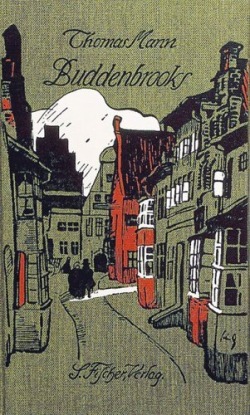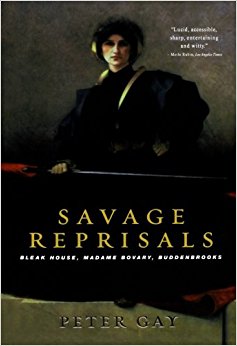
In its eagerness to be seen, this post published a day early. It’s best read after part three, which you can find over at Tony’s Reading List.
*************
Tony Malone of Tony’s Reading List and I have been chatting about Thomas Mann’s Buddenbrooks for the past few days. Today’s installment brings our musings to a conclusion – for now. You’ll see, if you read to the end, that I’m not quite done with the Buddenbrooks just yet ….
The story so far:
Part One – Background, Business and Buildings
Part Two – Character Flaws in the 3rd and 4th generations
Part Three – On technique and the translation of dialects
And so to Part Four – A 20th century novel in 19th century clothing
LS: To return to the decline of the Buddenbrooks. We’ve identified a number of reasons for it: the unstoppable course of history, poor commercial decisions and marriages, as well as the corrupting influence of the artistic nature. That enables Buddenbrooks to be read on multiple levels. The historical and domestic dramas, firmly grounded in the realism of the nineteenth century, are what makes it so readable (not a dirty word in my lexicon). It could also be read as a fin-de-siécle novel – just think of all those images of decadence and decay, in particular, the teeth. As for the poor artist (or musician in this case) as the embodiment of the conflict between self-fulfillment and duty, this is a theme which Mann returns to again and again throughout his career. There are obviously autobiographical elements to this, but this is the theme that to my mind turns Buddenbrooks into what I think of as “a twentieth century novel in nineteeth century clothing”. Do you see what I mean by that?
TM: Yes, very much so. I mentioned the idea of a comfort read early in this conversation, and Buddenbrooks certainly has that Victorian Literature aura about it, a long, rambling family saga with a few weddings and the odd funeral (the Trollope comparison suddenly seems rather apt!). However, there’s a definite post-modern feel to the work, something that Mann declares from the very start with the novel’s alternative title (Verfall einer Familie). Yes, it’s a story about the comfortably-off that won’t scare the middle-class horses, but there’s an air of inevitable doom hovering over everything that even first-time readers will sense rather quickly. That’s my take on it anyway – is there anything else you meant by your statement?
LS: I’m thinking of the way the novel anticipates preoccupations that became more pronounced in the literature of the twentieth century. Talking to his brother, Heinrich, prior to publication, Mann himself said. “The whole thing is metaphysics, music and adolescent eroticism”. Some of it not dealt with as explicitly as we’re now used to but nevertheless present. Thomas’s inner turmoil about what comes after death, the (albeit brief) comfort he found in the writings of Schopenhauer. We’ve already commented on the importance of music in the novel, but let’s not forget the homage Mann paid to Wagner, the source of his beloved leitmotif. As for that final point, take another look at those passages where Hanno is improvising on the pianoforte and tell me that Mann isn’t alluding to a different kind of satisfaction entirely …. (More ellipsis!) Finally what’s going on when Hanno’s friend, Kai, visits him on his deathbed and kisses his hand. There are homeoerotic undertones there. For why else would the family need to think about it for a good while afterwards?
 Which brings us back to the autobiographical and the well-documented issues with Mann’s own sexuality. That Buddenbrooks was autobiographical like many debut novels, I always knew, but not quite how much. I’ve just read a terrific essay, in Savage Reprisals, written by Peter Gay, which I can wholeheartedly recommend. Very illuminating, particularly about the “metaphysics, music and adolescent eroticism”, but also about the autobiography. For instance, did you know that Mann’s father – like Thomas Buddenbrooks – stipulated that his grain business be sold off as he recognised that neither of his sons had the wherewithal to continue with it? That action causing such feelings of guilt in Thomas Mann that you could say it compounded already existing internal conflicts, but it also spawned such anger that he was impelled to write Buddenbrooks which in 1905 he called “the artist’s sublime revenge on his experience”. To quote Peter Gay the novel is “a revenge on a father disappointed in his son’s failure to succeed, and a revenge on a reputable, upright society that expected him to be more infallibly masculine than he turned out to be”.
Which brings us back to the autobiographical and the well-documented issues with Mann’s own sexuality. That Buddenbrooks was autobiographical like many debut novels, I always knew, but not quite how much. I’ve just read a terrific essay, in Savage Reprisals, written by Peter Gay, which I can wholeheartedly recommend. Very illuminating, particularly about the “metaphysics, music and adolescent eroticism”, but also about the autobiography. For instance, did you know that Mann’s father – like Thomas Buddenbrooks – stipulated that his grain business be sold off as he recognised that neither of his sons had the wherewithal to continue with it? That action causing such feelings of guilt in Thomas Mann that you could say it compounded already existing internal conflicts, but it also spawned such anger that he was impelled to write Buddenbrooks which in 1905 he called “the artist’s sublime revenge on his experience”. To quote Peter Gay the novel is “a revenge on a father disappointed in his son’s failure to succeed, and a revenge on a reputable, upright society that expected him to be more infallibly masculine than he turned out to be”.
TM: There’s certainly a lot going on beneath the surface, but I wouldn’t say that I really focused on this angle in my own reading of the book (probably because I haven’t really gone into the author’s background). Of course, when it comes to some of Mann’s other books, these themes are far more prominently foregrounded, and for anyone who has read more of his work, it’s fascinating to draw parallels between them. Death in Venice (Der Tod in Venedig) is the obvious example, and you could almost make the claim that von Aschenbach is a sort of possible future Hanno, one that survived and ended up lusting after young boys in Italy. Tonio Kröger focuses more on the loneliness of the artist and even takes us down to Munich for a brief interlude, a stay very different from, but nevertheless reminiscent of, Tony’s disastrous time in Bavaria.
What interests me most, though, is the obsession with ill health and the effect it has on the way we approach life. Tristan is a short piece set in a sanatorium, but the ultimate goal for any Thomas Mann admirer must surely be to pack their rucksack and set off on a hike up The Magic Mountain (Der Zauberberg). Is that a journey you’re looking to make, having finished Buddenbrooks?
LS: Oh, I’m not finished with the Buddenbrooks yet! I’m currently half-way through the 12-part TV series from 1979. After that I’ll move onto Tonio Kröger, Mann’s personal favourite from his oeuvre, I might think about The Magic Mountain for next year’s German Literature Month, but only if you’ll agree to another conversation like this one. Thank you for taking the time to do this this. I found it a much more rewarding experience than trying to shoehorn a 600-page masterpiece into a 500-word review!
TM: Well, I think we might have passed the 500-word mark long ago! Thank you for the chat, and as for another ascent of Mann’s magic mountain, well, you never know.